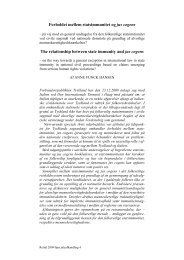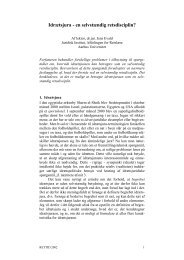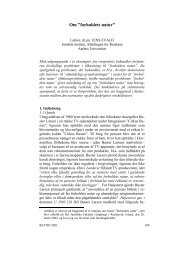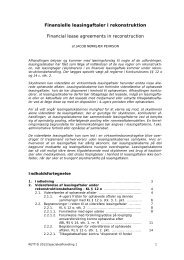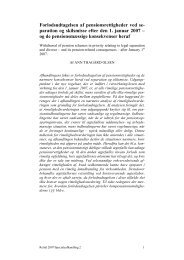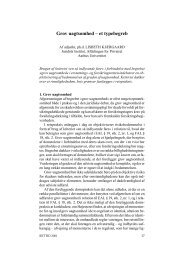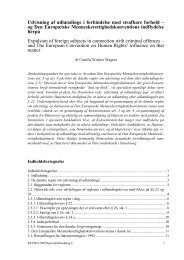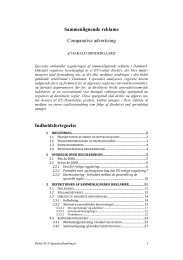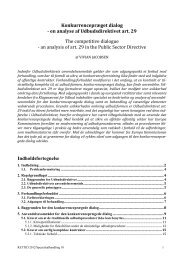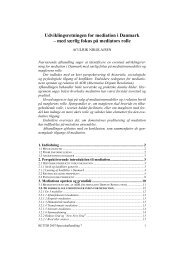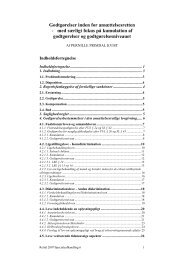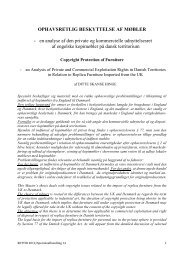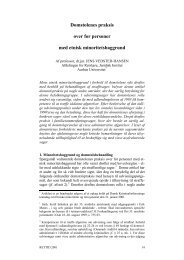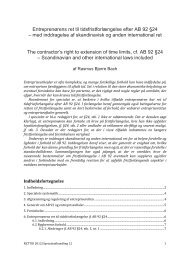Product liability under the CISG and Concurring tort law claims ...
Product liability under the CISG and Concurring tort law claims ...
Product liability under the CISG and Concurring tort law claims ...
Create successful ePaper yourself
Turn your PDF publications into a flip-book with our unique Google optimized e-Paper software.
scope of <strong>the</strong> Convention”. 52 This conclusion is supported by Professor Honnold, who finds that “except for<br />
unusual circumstances, <strong>the</strong> Convention would not govern actions by a buyer against persons o<strong>the</strong>r than <strong>the</strong><br />
seller <strong>and</strong> consequently would not interfere with domestic rules, such as product <strong>liability</strong>, that permit such<br />
actions”. 53<br />
Thus <strong>the</strong> prevailing view is that <strong>the</strong> Convention does not govern third party <strong>claims</strong> <strong>and</strong> that such should be<br />
dealt with according to <strong>the</strong> domestic <strong>law</strong> applicable, based on <strong>the</strong> rules of private international <strong>law</strong>. However,<br />
according to <strong>the</strong> Professors Schwenzer <strong>and</strong> Schmidt <strong>the</strong> determining factor is that <strong>the</strong> manufacturer´s<br />
financial outcome remains <strong>the</strong> same. Whe<strong>the</strong>r <strong>the</strong> claim is raised due to recourse within <strong>the</strong> respective<br />
contract relationship, ultimately attributing <strong>the</strong> loss to <strong>the</strong> manufacturer or through a direct claim is unimportant.<br />
54 Although <strong>the</strong> learned professors do have a point in <strong>the</strong>ir statement, it is this author´s opinion<br />
that it is rash to refer to <strong>the</strong> method, which is use to climb down <strong>the</strong> contractual chain, as unimportant.<br />
Leaving such a topic unresolved creates unnecessary uncertainties regarding <strong>the</strong> applicable <strong>law</strong> <strong>and</strong> such<br />
uncertainties can easily lead to an increase in litigation costs <strong>and</strong> an increase in <strong>the</strong> general cost for goods<br />
sold in international trade as a result of this. This contradicts <strong>the</strong> very aim of <strong>the</strong> Convention, which was to<br />
create certainty <strong>and</strong> uniform rules in international trade.<br />
Even though <strong>the</strong> prevailing view is that <strong>the</strong> Convention does not govern third party <strong>claims</strong>, it is possible<br />
that in situations where <strong>the</strong> manufacturer has participated substantially in a sale to an ultimate buyer, <strong>the</strong><br />
domestic courts will come to <strong>the</strong> conclusion that <strong>the</strong> manufacturer is a “seller” according to art 4 <strong>CISG</strong>.<br />
This was <strong>the</strong> case in a dispute brought before <strong>the</strong> District Court in California, U.S. in 2001. 55 The court applied<br />
<strong>the</strong> Convention to determine a U.S. buyer´s rights against a Canadian manufacturer of computer<br />
chips, which <strong>the</strong> buyer had purchased from a U.S. distributor. The buyer claimed that <strong>the</strong> computer chips<br />
did not conform to representations made by <strong>the</strong> manufacturer to <strong>the</strong> buyer.<br />
It would appear that <strong>the</strong> court did not consider <strong>the</strong> issue of direct <strong>claims</strong> against third parties <strong>and</strong> <strong>the</strong> wording<br />
of art 4 <strong>CISG</strong> <strong>and</strong> as a result <strong>the</strong> judgement has been criticized <strong>and</strong> deemed as unconvincing precedence.<br />
56<br />
In any event, <strong>the</strong> case illustrates that if <strong>the</strong>re is a direct connection between <strong>the</strong> manufacturer <strong>and</strong> <strong>the</strong> ultimate<br />
buyer, it is possible that domestic courts will view this as a contractual relationship in itself. This<br />
must be taken into account by international traders, regardless of whe<strong>the</strong>r <strong>the</strong> approach is viewed as erroneous<br />
<strong>and</strong> out of tune with <strong>the</strong> provisions in <strong>the</strong> Convention.<br />
3.1.2. Manufacturer´s implied or express warranty<br />
Some manufacturers provide dealers <strong>and</strong> distributors with a guarantee or warranty in connection with a<br />
sale of <strong>the</strong> goods to pass on to potential buyers. Providing such a warranty can have many purposes, e.g. to<br />
encourage sales via <strong>the</strong> confidence that potential buyers have in a well-known manufacturer. The question<br />
is whe<strong>the</strong>r such a warranty makes <strong>the</strong> manufacturer a “seller” within <strong>the</strong> language of art 4 <strong>CISG</strong> in relation<br />
to <strong>the</strong> ultimate buyer, even though <strong>the</strong> distributor executed <strong>the</strong> actual contract with <strong>the</strong> ultimate buyer.<br />
52 Schwenzer/Schmidt Parties page 114 section 3.1, Hachem in Schwenzer page 84 para 23 <strong>and</strong> Stoll in Schlechtriem/Thomas<br />
page 564 para 26.<br />
53 Honnold, Fourth edition page 94 para 71 <strong>and</strong> page 77 para 63 cf. n. 10. See also Huber in Schlechtriem/Thomas page<br />
368 para 37.<br />
54 Schwenzer/Schmidt page 115 section 3.1.<br />
55 Asante Technologies, Inc. v. PMC-Sierra, Inc.<br />
56 Honnold, Fourth edition page 78 para 63.<br />
RETTID 2012/Specialeafh<strong>and</strong>ling 26 16



